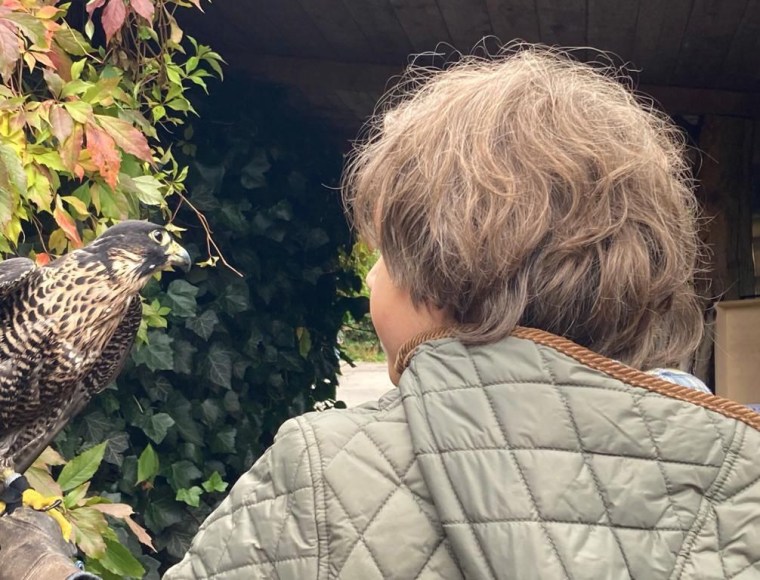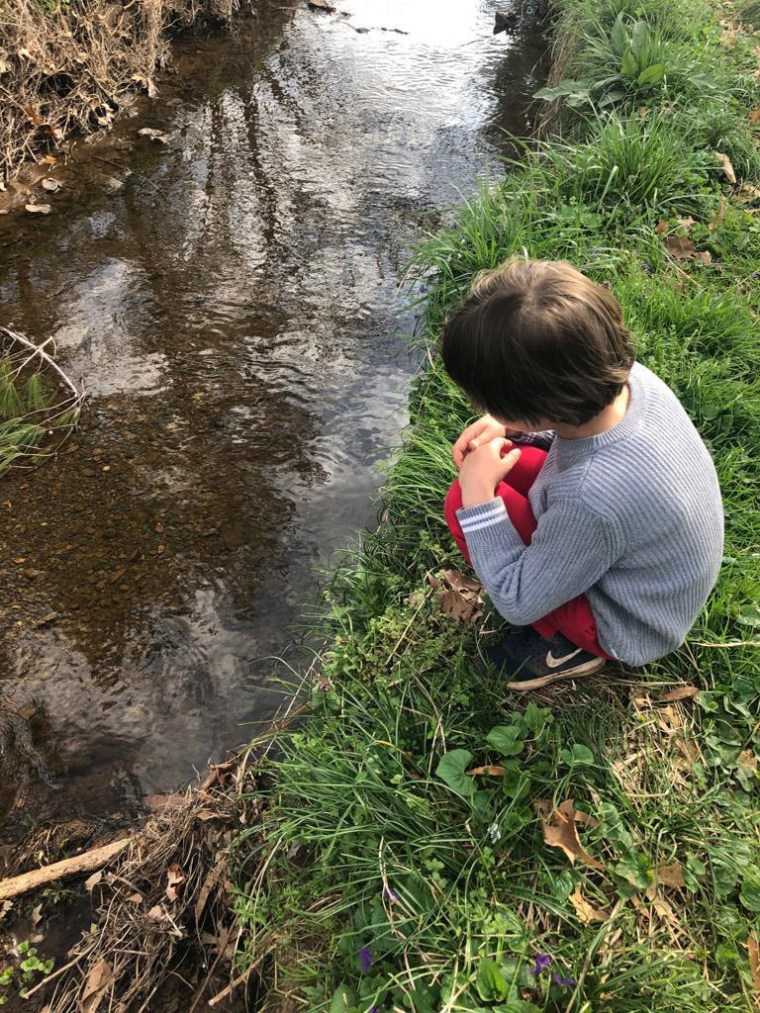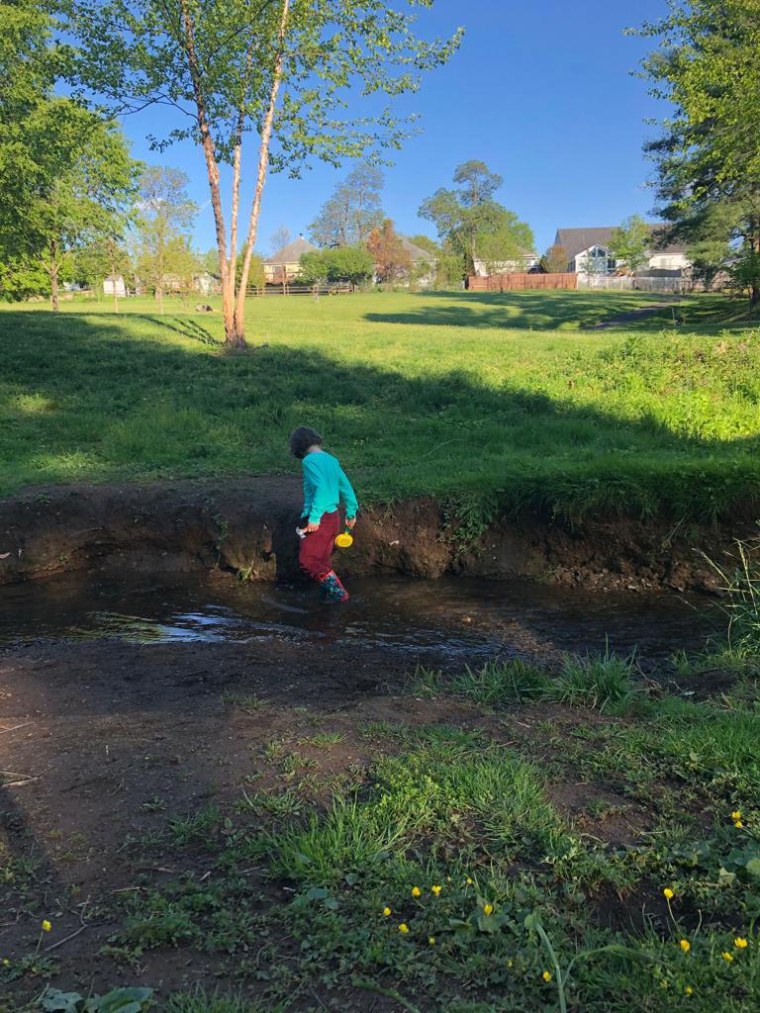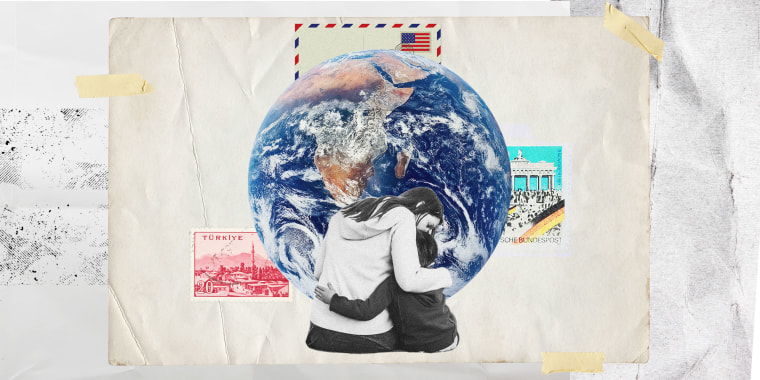When my son Sami was 3 years old, he and I were standing outside of a quaint coffee shop in Connecticut when a middle-aged woman asked him, “Where are you from?” After pausing for a moment, he looked up at a graffitied wall. At its center, a street artist had painted the globe.
“My mom is from America, my dad is Turkish from Germany and I am from Earth,” he replied, pointing at that wall.
This is my favorite story of Sami, now 9, who describes himself as “American-Turkish-German-Jewish-Muslim.”
I met my Turkish-from-Germany husband almost two decades ago in Brooklyn, during a sticky-sweet summer between adolescence and adulthood. We sipped iced coffee as we discussed the potential of coupling off, even marrying one another. We joked about our future “peace babies,” who would be born to a Jewish mother (me) and a Muslim father (him). The whole world felt so open then, a place of possibility and hope that our generation could usher in a better world.

The idea of our peace babies eventually became our present: Sami was born in Germany in 2014, whereas his sister was born in the United States in 2019. My husband grew up in Berlin and I grew up in New York City, and we have remained rooted in both countries due to our work and extended families.
Today, my Jewish-Muslim family faces our broken world with wet and tired eyes. The Israel-Hamas war, while geographically far away from our lives and families, has hit us close to home.
The ongoing conflict has left me bereft and uncertain about the future of my two young children. I have long lived to the beat of interculturality, cosmopolitanism and commonality, yet I now acutely feel — as another author in my virtual writing group recently described herself — like “a stranger in my own life.”
But as the war rages on, my own feelings of loss are met each day with how Sami embodies the Jewish tradition tikkun olam — our shared responsibility to heal a broken world.
Sami chooses “both” and never “or." He chooses, always, the fullness of our world.
Since toddlerhood, Sami has adored all forms of wildlife, from bullfrogs to blue herons with spindly legs. He used to make daily visits to groundhogs, and falcons have perched on his arm. He sees himself as a custodian of nature, tasked with revitalizing the habitats destroyed by humans and protecting endangered species from extinction. Sami specifically mourns the extinct Hawaiian Kauaʻi ʻōʻō bird, last seen in 1987; this is one of his many declarations of love for the natural world.
I surmise this love of Sami’s is innate, as he was born to two squarely urban people. My husband and I fear forests, bugs, lakes and the deep sea. Yet Sami’s holistic view of the Earth is also somehow born of us, with the map that makes up his life spanning Europe, North America and Asia.
It feels strange to say that my 9-year-old is filled with wisdom. Yet somehow, my young boy with an old soul has taught me how to be a custodian of the world that we share: how to avoid killing a spider, how to tend to the plants that I too often forget about and how to proudly refute the divisions we are told should divide us.

“Are you Jewish OR Muslim?” is a question that will follow Sami for the rest of his life. And yet he always seeks bridges, rather than pull himself apart.
Sometimes, Sami asks me to read him the "Jewish Quran," what he calls the Torah, to help him sleep at night. During Eid, he requests latkes. On Passover, he wonders whether the Prophet Elijah and the Prophet Muhammad were friends. He chooses “both” and never “or." He chooses, always, the fullness of our world.
Sami’s Palestinian teacher, Mohammad, says that in his music class, my son’s assertion of his Jewish-Muslim identity gives him hope. At this time of crisis, when Mohammad’s world has been shaken to its core, he recently sat with our children, teaching them the lyrics to “Jingle Bell Rock.” A Jewish-Muslim boy singing a Christmas song with his Palestinian teacher is a lesson of unity in its own, and one of the few things that warms my heart during these dark days.

The war is not physically in our home, but we cannot keep it away from us. It is in the news, on our tongues, in our hearts. “Who is killing who?” Sami asks. “Are Israelis killing Palestinians? Are Palestinians killing Israelis? Are Palestinians Muslims? Are Israelis Jews?” When we explain the complexity of it all, he sighs.
Recently, Sami has begun to draw warriors in combat, one made of fire, the other of water, fighting over and destroying the land that they share. Sometimes, he draws children as small figures without faces hovering in the background that “see everything.” When I ask him to describe the scene he has laid out on the page, he says, “All of the warriors are the bad guys. The children are the sad guys.” He pauses. “And me, I’m on the side of the children.”
“Hope is made of peace,” Sami recently told me. “And peace is made of hope.”
Like my beautiful son, I too am on the side of the children. I am scared for them and with them, bereft at the photographs of kidnapped toddlers from kibbutzim, and Palestinian children buried under the rubble of collapsed homes. I am an academic and an author, but first and foremost, I am a mother.
“Hope is made of peace,” Sami recently told me. “And peace is made of hope.”
Today, I look back to that New York City summer so many years ago, when my husband and I joked about our future peace babies. We were naïve, maybe, but we had also not yet been hardened by life. We believed that love could transcend the boundaries we were told should divide us. And so, we looked that lie in the face. In fact, we knocked it down, building a life and raising two children who prove otherwise every single day.
I knew back then, and I still know now, that we can only find a safe place in the world by holding onto and uplifting one another. This truth lives in our daughter and son. It beats in their hearts. Knowing this allows me to face, but not drown, in the quicksand of immeasurable loss.
